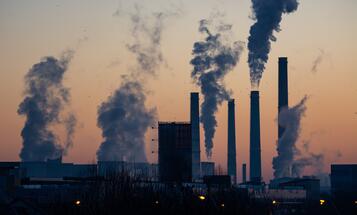
Recipe for Instability: Water Scarity and Climate Change
Why conservative policymakers' climate denial has far-researching national security implications.
Today is World Water Day, a day dedicated to raising awareness of the role that fresh water resources play and underscoring the importance of sustainably managing these resources. Every person on the planet drinks between 2-4 litres (roughly 0.5-1 gallon) of water per day, most of which is embedded in the food we eat. Producing one pound of beef, for example, requires nearly 1800 gallons of water. With an estimated 9 billion people by 2050, fresh water will become increasingly important and increasingly scarce—two factors that will contribute to existing political tensions.
A new U.S. Intelligence Report looks at how water problems, including scarcity, poor water quality, and floods, will impact U.S. national security issues over the next 30 years. The report concludes that while water problems may not cause full out wars in the next 10 years, there will be increased risk of instability and state failure, increased regional tensions, and economic disruption that will have an effect on U.S. national security. In particular, North Africa, the Middle East, and South Asia will face major challenges coping with water problems, regions that are already struggling with political stability.
Water problems will also exacerbate food production disruption, given the amount of water agriculture requires. Beyond impacting specific countries, regional food production issues pose a risk to global food markets, which are already experiencing record food prices. Increasing food prices will drive more people into food insecurity and impact those with the least amount of resources.
The report cites increasing demand due to rising populations, decreasing supply, and poor management as the main causes of water problems. The report states that supply is decreasing because, “reductions in meltwater caused by climate change induced receding glaciers and reduced snow packs will have significant impacts.” (emphasis mine). So, a report from the U.S. intelligence community not only acknowledges climate change -- as other such reports have -- but also ties it to the very serious issue of water scarcity.
Let’s contrast this with some statements and actions from conservative governors in states that are extremely vulnerable to climate change.
When asked if he believed in climate change, Florida Governor Rick Scott said, “No. I have not been convinced.” Eight of the top 10 cities with the greatest risk of coastal flooding from increased water levels are in Florida. Louisiana Governor Bobby Jindal tried to block the EPA from regulating greenhouse gases, even though his state is already seeing the negative impacts of climate change. Texas Governor Rick Perry claimed that climate change was a hoax dreamed up by scientists looking to make money, even though his state suffered severe drought this past year due and will likely face further drought due to increasing temperatures and decreasing rainfall.
So on the one hand, you have the national security community detailing the impacts of climate change and on the other hand, you have conservative leaders trying to outdo each other in climate denial. Between the two, I’m going to bet that the people with incredibly sophisticated monitoring and evaluation tools are right.



